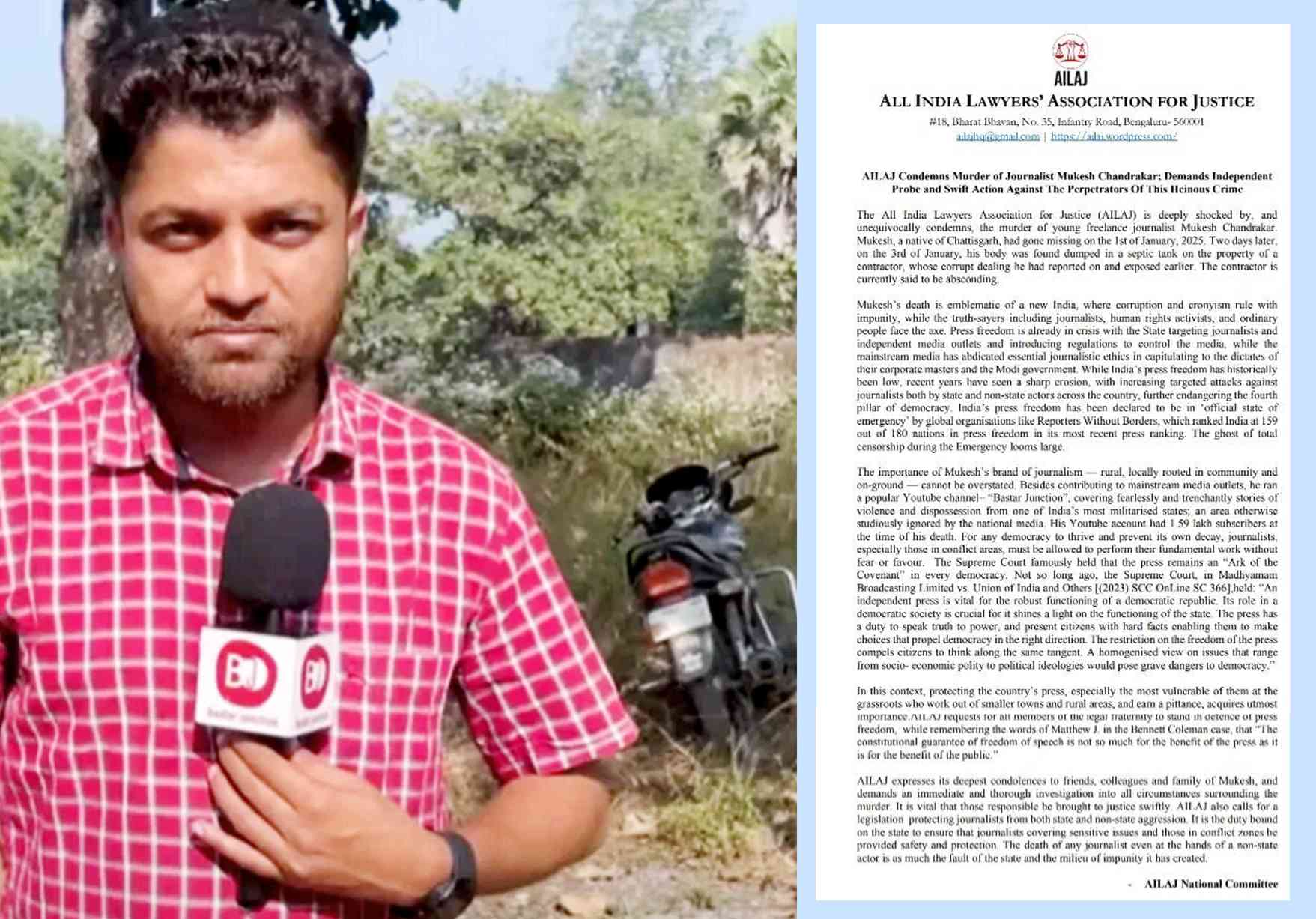Murder of Journalist Mukesh Chandrakar: Demand for Independent Probe and Swift Action Against Perpetrators

The All India Lawyers Association for Justice (AILAJ) is deeply shocked by, and unequivocally condemns, the murder of young freelance journalist Mukesh Chandrakar. Mukesh, a native of Chattisgarh, had gone missing on the 1st of January, 2025. Two days later, on the 3rd of January, his body was found dumped in a septic tank on the property of a contractor, whose corrupt dealing he had reported on and exposed earlier. The contractor is currently said to be absconding.
Mukesh’s death is emblematic of a new India, where corruption and cronyism rule with impunity, while the truth-sayers including journalists, human rights activists, and ordinary people face the axe. Press freedom is already in crisis with the State targeting journalists and independent media outlets and introducing regulations to control the media, while the mainstream media has abdicated essential journalistic ethics in capitulating to the dictates of their corporate masters and the Modi government. While India’s press freedom has historically been low, recent years have seen a sharp erosion, with increasing targeted attacks against journalists both by state and non-state actors across the country, further endangering the fourth pillar of democracy. India’s press freedom has been declared to be in ‘official state of emergency’ by global organisations like Reporters Without Borders, which ranked India at 159 out of 180 nations in press freedom in its most recent press ranking. The ghost of total censorship during the Emergency looms large.
The importance of Mukesh’s brand of journalism — rural, locally rooted in community and on-ground — cannot be overstated. Besides contributing to mainstream media outlets, he ran a popular Youtube channel– “Bastar Junction”, covering fearlessly and trenchantly stories of violence and dispossession from one of India’s most militarised states; an area otherwise studiously ignored by the national media. His Youtube account had 1.59 lakh subscribers at the time of his death. For any democracy to thrive and prevent its own decay, journalists, especially those in conflict areas, must be allowed to perform their fundamental work without fear or favour. The Supreme Court famously held that the press remains an “Ark of the Covenant” in every democracy. Not so long ago, the Supreme Court, in Madhyamam Broadcasting Limited vs. Union of India and Others [(2023) SCC OnLine SC 366],held: “An independent press is vital for the robust functioning of a democratic republic. Its role in a democratic society is crucial for it shines a light on the functioning of the state. The press has a duty to speak truth to power, and present citizens with hard facts enabling them to make choices that propel democracy in the right direction. The restriction on the freedom of the press compels citizens to think along the same tangent. A homogenised view on issues that range from socio- economic polity to political ideologies would pose grave dangers to democracy.”
In this context, protecting the country’s press, especially the most vulnerable of them at the grassroots who work out of smaller towns and rural areas, and earn a pittance, acquires utmost importance. AILAJ requests for all members of the legal fraternity to stand in defence of press freedom, while remembering the words of Matthew J. in the Bennett Coleman case, that “The constitutional guarantee of freedom of speech is not so much for the benefit of the press as it is for the benefit of the public.”
AILAJ expresses its deepest condolences to friends, colleagues and family of Mukesh, and demands an immediate and thorough investigation into all circumstances surrounding the murder. It is vital that those responsible be brought to justice swiftly. AILAJ also calls for a legislation protecting journalists from both state and non-state aggression. It is the duty bound on the state to ensure that journalists covering sensitive issues and those in conflict zones be provided safety and protection. The death of any journalist even at the hands of a non-state actor is as much the fault of the state and the milieu of impunity it has created.
- AILAJ National Committee
Charu Bhawan, U-90, Shakarpur, Delhi 110092
Phone: +91-11-42785864 | +91 9717274961 E-mail: info@cpiml.org

